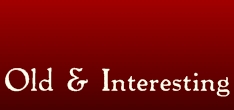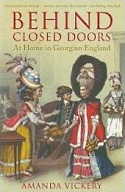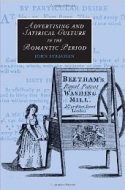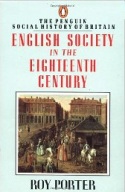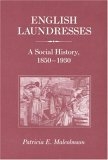-
History of:
- Resources about:
- More:
- Baby walkers
- Bakehouses
- Bed warmers
- Beer, ale mullers
- Besoms, broom-making
- Box, cabinet, and press beds
- Butter crocks, coolers
- Candle snuffers, tallow
- Clothes horses, airers
- Cooking on a peat fire
- Drying grounds
- Enamel cookware
- Fireplaces
- Irons for frills & ruffles
- Knitting sheaths, belts
- Laundry starch
- Log cabin beds
- Lye and chamber-lye
- Mangles
- Marseilles quilts
- Medieval beds
- Rag rugs
- Rushlights, dips & nips
- Straw mattresses
- Sugar cutters - nips & tongs
- Tablecloths
- Tinderboxes
- Washing bats and beetles
- Washing dollies
- List of all articles
Subscribe to RSS feed or get email updates.
Amanda Vickery, Behind Closed Doors: At Home in Georgian England, from Amazon.comor Amazon UK

John Strachan, Advertising and Satirical Culture in the Romantic Period, from Amazon.comor Amazon UK

Roy Porter, English Society in the Eighteenth Century, from Amazon.comor Amazon UK

Patricia E. Malcolmson, English Laundresses: A Social History, 1850-1930 from Amazon.com
or Amazon UK
Edward Beetham
Biographical notes for the man behind the 1790s "patent washing mill"
The Bethams of Westmorland were gentry who could trace their heritage back several generations. Edward, born c1744, was a bit of a rebel. He upset his father by joining a travelling theatre company in Appleby, and then making his way south to London. His father then stopped any financial support. This may have been the time when the young man added an 'e' to his surname to make it Beetham.
In London he started a theatre career, on stage and behind the scenes, with help from Samuel Foote, manager of the Haymarket theatre. He invented a new way of rolling up theatre curtains, believed to be an improvement in fire safety.
He married Isabella Robinson around 1774. As Isabella Beetham she had some success as an artist specialising in silhouettes and small portraits of people in profile. She also took students and painted on glass. Beetham made a trip to Venice in 1784-5 and learned about glass gilding techniques there.
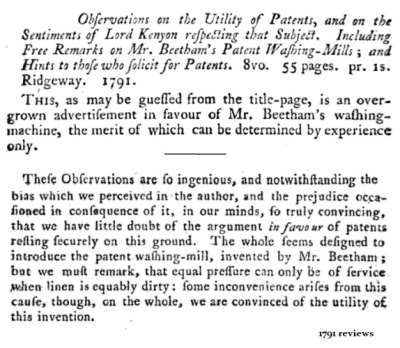 The couple lived for some time at 27, Fleet Street, London, opposite
St. Dunstan's
Church, in a part of town buzzing with coffee houses, publishers, booksellers, taverns,
and a variety of commercial and legal firms. By 1794 they had moved to a larger
house nearby in Chancery Lane, while keeping the Fleet Street premises for business,
for Isabella's studio, and letting some rooms to tradesmen and lodgers.
The couple lived for some time at 27, Fleet Street, London, opposite
St. Dunstan's
Church, in a part of town buzzing with coffee houses, publishers, booksellers, taverns,
and a variety of commercial and legal firms. By 1794 they had moved to a larger
house nearby in Chancery Lane, while keeping the Fleet Street premises for business,
for Isabella's studio, and letting some rooms to tradesmen and lodgers.
Edward did some publishing and bookselling but was most famous for his washing machine business, and especially his "patent washing mill". The patent(s) seem to have been granted for other people's inventions (see history of washing machines page), though Beetham was certainly a clever man who presumably developed the technical specifications into a saleable product, and then promoted it creatively. The anonymous book on "the utility of patents...including free remarks on Mr. Beetham's patent washing mills" was one of his PR ideas, and he advertised enthusiastically in several newspapers.
The Beethams had friends with literary and artistic interests. Edward was one of a select few booksellers around 1790 who handled the theatrical review magazine, The Prompter. As well as keeping up an interest in the theatre and cutting-edge laundry technology, Beetham published a variety of pamphlets and books including Stackhouse's History of the Bible (1787). He wrote the satirical Lectures on Heads which ran to more than one edition. Alongside the washing mill, he sold mangles, butter churns, a timepiece, and a "chiropedal car". He also laid on demos of "scientific" trials comparing washing with soap alone, versus washing with soda and soap, apparently sponsored by the Alkali Manufactory of North Street, Poplar, London, c1798.
It seems the washing mill made him serious money. Family tradition says this, (see Earland) and it is what he is best known for. If his sales figures were accurate (he invited newspaper readers to inspect his records to confirm them) they were impressive in 1790-1791: 1121 mills sold. His mill is mentioned in odd pieces of writing - estate sale notices, humorous essays etc. - as no other washing machine is. Trade directories etc. usually list him as a washing machine supplier, though one lists him as "Beetham, Edward, Publisher, Bookseller and Profilist, 27, Fleet-St" in 1789 and 1793 - rather unfair to Isabella Beetham who was the successful profilist/silhouettist.
CHIROPEDAL CAR
By carrying two persons up or down a hill, and without horses, six miles an hour, is the most useful, pleasant, economical, and expeditious mode of Travelling that can possibly be adopted.
This admirable Invention may be seen for One Shilling each Person.
...at Beetham's repositories, Nos. 26 and 27 Fleet Street
True Briton (1793), issue 28
He was involved in two patent-related disputes. In one he challenged S.Bird in court for infringing a patent "the plaintiff had obtained, for a portable washing mill". A newspaper notice from Thomas Oxenham cast doubts on the validity of a mangle patent granted to Hayes in 1792 and used by Beetham.
In 1807 he was one of the first directors of the newly-started Eagle Insurance Company, whose secretary was a William Beetham (son?). He was still listed at 27 Fleet Street in 1808, when he would have been about 64. Chancery Lane had been redeveloped in 1799, so the family home must have moved.
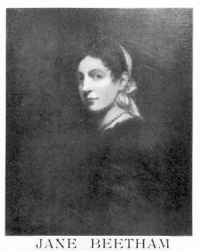 Family
Family
- William Betham, Edward's father, born 1698
- Rev. William Betham, Edward's brother, 1749 - 1839, born Little Strickland, Westmorland. Antiquarian writer, headmaster, rector.
- Isabella Beetham, née Robinson, profilist, artist, teacher, painter of miniatures on glass, approx. 1753-1825?, married Edward c1774?
- Mary Matilda Betham, 1776–1852, Edward's niece, poet and miniaturist, stayed in Chancery Lane c1794
- Jane Read, née Beetham, eldest daughter, born c1774, artist, exhibited at RA, married to solicitor
- Harriet Beetham, 2nd daughter
- Cecilia Beetham, 3rd daughter
- William Beetham, son?, founder-secretary to Eagle Insurance Co., later MD
- Sir William Betham (1779–1853), nephew
Pictures
Published writing
- Moral Lectures on Heads, Newcastle, 1780
- Beetham's New Lectures on Heads, Newcastle, 1785, "by E.Beetham, Little Strickland, Westmorland"
- Beetham's New Lectures on Heads, London, 1785, second edition
- Observations on the utility of patents, and on the sentiments of Lord Kenyon respecting that subject. Including free remarks on Mr. Beetham's patent washing mills, London, 1791, 3 editions
Friends and visitors to the Beetham household
- John Opie
- Samuel Foote
- Charles Lamb
- Admiral Bligh, related by marriage
- Henry Thomson
- Amelia Alderson, later Mrs. Opie, student of Isabella Beetham
- Thomas Bellamy
Sources
- Ada Earland, John Opie and his Circle, 1911
- Historical newspaper databases
- 18th and 19th century trade directories
- John Strachan,
Advertising and Satirical Culture in the Romantic Period
, 2008, pages 48-49
- See also:
- Notes for washing machines page
Go to the History of washing machines before 1800 page.
 7 April 2011
7 April 2011
You may like our new sister site Home Things Past where you'll find articles about antiques, vintage kitchen stuff, crafts, and other things to do with home life in the past. There's space for comments and discussion too. Please do take a look and add your thoughts. (Comments don't appear instantly.)
For sources please refer to the books page, and/or the excerpts quoted on the pages of this website, and note that many links lead to museum sites. Feel free to ask if you're looking for a specific reference - feedback is always welcome anyway. Unfortunately, it's not possible to help you with queries about prices or valuation.
